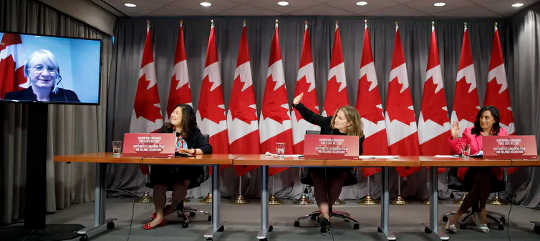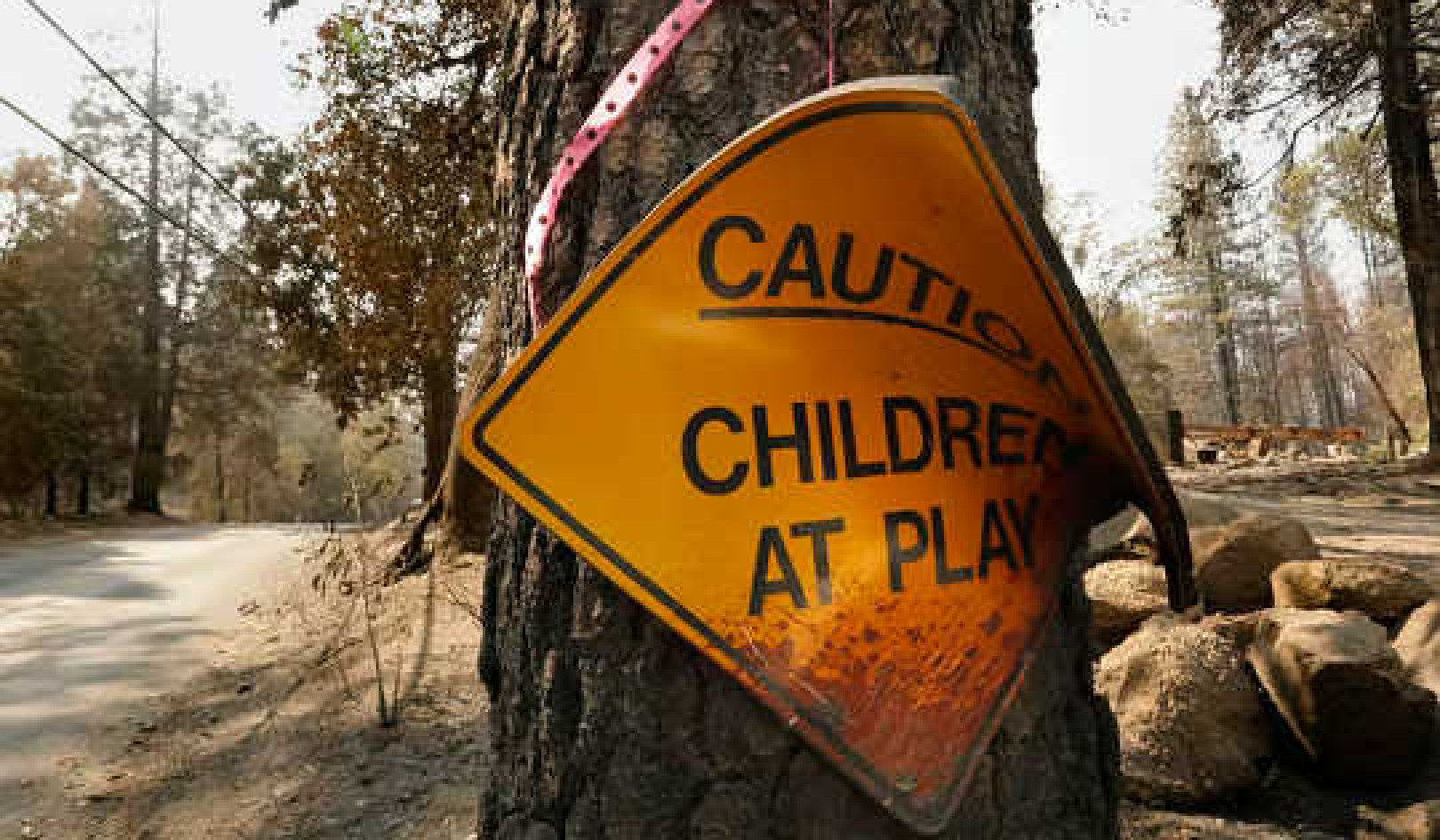 A sign of things to come? Finance Minister Chrystia Freeland, centre, is seen with Minister of Public Services and Procurement Anita Anand, right, and Mary Ng, Minister of International Trade, Small Business and Export Promotion, left, and Health Minister Patty Hajdu on the video screen. THE CANADIAN PRESS/Cole Burston
A sign of things to come? Finance Minister Chrystia Freeland, centre, is seen with Minister of Public Services and Procurement Anita Anand, right, and Mary Ng, Minister of International Trade, Small Business and Export Promotion, left, and Health Minister Patty Hajdu on the video screen. THE CANADIAN PRESS/Cole Burston
With Chrystia Freeland now holding the reins of the ministry of finance and Canada’s post-pandemic recovery plan, it’s time to ask whether the first woman — and feminist — to lead the portfolio will push for significant advances for gender equality.
Freeland was appointed finance minister in August 2020 after Bill Morneau’s swift departure, marking the first time in Canadian history that a woman has landed the job. The daughter of a feminist activist from northern Alberta, Freeland is also an avowed feminist herself — and so is her boss, Prime Minister Justin Trudeau.
I think we, feminists, have an obligation to support women around the world who suffer from much greater obstacles and repression. @wef #wef19 pic.twitter.com/BEP7Yzoysb
— Chrystia Freeland (@cafreeland) January 24, 2019
In her past role as foreign affairs and international trade minister, Freeland supported feminist policies like Canada’s Feminist International Assistance Policy. She has now envisioned a “green and equitable” recovery to a crisis that has disproportionately affected women, signalling that she might push for advances to gender equality.
But there are reasons to be skeptical.
Trudeau’s feminism questioned
Freeland will be working closely with Trudeau, whose own feminist credentials are increasingly under scrutiny. During his first campaign as Liberal leader, Trudeau touted his feminism proudly — remember “Because it’s 2015”? — only to bury the topic during his bid for re-election last year.
{vembed Y=o8OOIU7xQrk}
Trudeau explains his gender-balanced cabinet in 2015. (The Canadian Press)
That may have been due to the departures of star cabinet ministers Jody Wilson-Raybould and Jane Philpott, which sparked a conversation about Trudeau’s feminism.
Several times, it has been noted that the prime minister’s use of progressive language does not reflect his government’s actions.
We recently published a study based on an analysis of three years of official speeches by the prime minister and found that Trudeau rarely spoke from a feminist standpoint: gender equality and mentions of women’s rights were largely contained and limited by the discourse of economic prosperity.
Overall, we found that Trudeau’s understanding of feminism appears to align with “neoliberal feminism,” a form of feminism that focuses primarily on women’s economic empowerment as a means to achieve gender equality.
Neoliberalism is mostly marked by trade liberalization, deregulation and privatization of government services. It emphasizes economic prosperity as the ultimate measure of success, treating individuals as taxpayers or service users, rather than citizens.
Our paper highlights at least three ways in which neoliberal feminism is problematic. These may be relevant in questioning Freeland’s own feminist stance.
Structural barriers ignored
First, neoliberal feminism is based on the notion that individual empowerment is the highest form of citizenship. And so neoliberal feminists propose that as long as women have the same access to economic empowerment as men, they should be able to achieve full equality.
This view allows society to ignore the need to address deep structural barriers to substantive equality such as discrimination on the basis of race, ability, nationality and so on.
Second, the idea that women are best emancipated through economic empowerment tends to speak only to a certain group of them: The famous book Lean In, by Facebook’s Sheryl Sandberg, might have been well-received by privileged women and those climbing corporate ladders across the globe, but women in lower socio-economic ranks simply don’t have access to this type of individualist pursuit of success.
What’s more, no amount of leaning in would help most women of colour, transgendered persons, undocumented migrants or so many others overcome the very real barriers that they face in the workplace.
Finally, the type of casual approach that accompanies neoliberal feminism tends to gender-neutralize issues that are very much about gender, such as child care.
Overall, gender-neutralization works in much the same way as colour-blindness has worked when addressing questions of race and justice (in other words, not well).
Women become invisible
Neoliberalism has turned childcare into a question of children’s rights and success while ignoring its importance for women.
Another example of gender-neutralization is violence against Indigenous women and girls. To Trudeau’s credit, our study did find that he tends to address this issue head on.
Studies have found that if women-specific issues are not tackled as such, then women become invisible in policy-making.
There is no question that the Trudeau government has made efforts to bring a feminist lens to various files. The prime minister’s commitment to appointing women to important positions has had a positive effect; major policies have taken feminism into account, particularly in foreign affairs.
But Canada’s Feminist International Assistance Policy, which both Trudeau and Freeland support, uses feminism as a conduit for economic ends rather than considering gender equality an end on its own.
 Freeland elbow bumps Trudeau after being sworn in as finance minister at Rideau Hall in Ottawa on Aug. 18, 2020. THE CANADIAN PRESS/Sean Kilpatrick
Freeland elbow bumps Trudeau after being sworn in as finance minister at Rideau Hall in Ottawa on Aug. 18, 2020. THE CANADIAN PRESS/Sean Kilpatrick
This type of framework is gaining strength. Championed by global organizations like the World Bank, it proposes that women’s empowerment makes “good business sense” for countries. The problem is that, in this view, women end up as little more than a resource in the toolbox for economic prosperity. Our study confirms this point.
How, and how often, Freeland will apply her view of feminism in her new role remains to be seen. As the finance minister of a G7 nation, Freeland has entered a club of political leaders whose entire world view has been shaped by neoliberalism.
But if she wants a truly equitable recovery, Freeland will have to find a way out of this neoliberal straitjacket.![]()
About The Authors
Gabriela Perdomo, PhD Candidate, Department of Communication, L’Université d’Ottawa/University of Ottawa and Pascale Dangoisse, PhD candidate, Department of Communication, L’Université d’Ottawa/University of Ottawa
This article is republished from The Conversation under a Creative Commons license. Read the original article.
Recommended books:
Capital in the Twenty-First Century
by Thomas Piketty. (Translated by Arthur Goldhammer)
 In Capital in the Twenty-First Century, Thomas Piketty analyzes a unique collection of data from twenty countries, ranging as far back as the eighteenth century, to uncover key economic and social patterns. But economic trends are not acts of God. Political action has curbed dangerous inequalities in the past, says Thomas Piketty, and may do so again. A work of extraordinary ambition, originality, and rigor, Capital in the Twenty-First Century reorients our understanding of economic history and confronts us with sobering lessons for today. His findings will transform debate and set the agenda for the next generation of thought about wealth and inequality.
In Capital in the Twenty-First Century, Thomas Piketty analyzes a unique collection of data from twenty countries, ranging as far back as the eighteenth century, to uncover key economic and social patterns. But economic trends are not acts of God. Political action has curbed dangerous inequalities in the past, says Thomas Piketty, and may do so again. A work of extraordinary ambition, originality, and rigor, Capital in the Twenty-First Century reorients our understanding of economic history and confronts us with sobering lessons for today. His findings will transform debate and set the agenda for the next generation of thought about wealth and inequality.
Click here for more info and/or to order this book on Amazon.
Nature's Fortune: How Business and Society Thrive by Investing in Nature
by Mark R. Tercek and Jonathan S. Adams.
 What is nature worth? The answer to this question—which traditionally has been framed in environmental terms—is revolutionizing the way we do business. In Nature’s Fortune, Mark Tercek, CEO of The Nature Conservancy and former investment banker, and science writer Jonathan Adams argue that nature is not only the foundation of human well-being, but also the smartest commercial investment any business or government can make. The forests, floodplains, and oyster reefs often seen simply as raw materials or as obstacles to be cleared in the name of progress are, in fact as important to our future prosperity as technology or law or business innovation. Nature’s Fortune offers an essential guide to the world’s economic—and environmental—well-being.
What is nature worth? The answer to this question—which traditionally has been framed in environmental terms—is revolutionizing the way we do business. In Nature’s Fortune, Mark Tercek, CEO of The Nature Conservancy and former investment banker, and science writer Jonathan Adams argue that nature is not only the foundation of human well-being, but also the smartest commercial investment any business or government can make. The forests, floodplains, and oyster reefs often seen simply as raw materials or as obstacles to be cleared in the name of progress are, in fact as important to our future prosperity as technology or law or business innovation. Nature’s Fortune offers an essential guide to the world’s economic—and environmental—well-being.
Click here for more info and/or to order this book on Amazon.
Beyond Outrage: What has gone wrong with our economy and our democracy, and how to fix it -- by Robert B. Reich
 In this timely book, Robert B. Reich argues that nothing good happens in Washington unless citizens are energized and organized to make sure Washington acts in the public good. The first step is to see the big picture. Beyond Outrage connects the dots, showing why the increasing share of income and wealth going to the top has hobbled jobs and growth for everyone else, undermining our democracy; caused Americans to become increasingly cynical about public life; and turned many Americans against one another. He also explains why the proposals of the “regressive right” are dead wrong and provides a clear roadmap of what must be done instead. Here’s a plan for action for everyone who cares about the future of America.
In this timely book, Robert B. Reich argues that nothing good happens in Washington unless citizens are energized and organized to make sure Washington acts in the public good. The first step is to see the big picture. Beyond Outrage connects the dots, showing why the increasing share of income and wealth going to the top has hobbled jobs and growth for everyone else, undermining our democracy; caused Americans to become increasingly cynical about public life; and turned many Americans against one another. He also explains why the proposals of the “regressive right” are dead wrong and provides a clear roadmap of what must be done instead. Here’s a plan for action for everyone who cares about the future of America.
Click here for more info or to order this book on Amazon.
This Changes Everything: Occupy Wall Street and the 99% Movement
by Sarah van Gelder and staff of YES! Magazine.
 This Changes Everything shows how the Occupy movement is shifting the way people view themselves and the world, the kind of society they believe is possible, and their own involvement in creating a society that works for the 99% rather than just the 1%. Attempts to pigeonhole this decentralized, fast-evolving movement have led to confusion and misperception. In this volume, the editors of YES! Magazine bring together voices from inside and outside the protests to convey the issues, possibilities, and personalities associated with the Occupy Wall Street movement. This book features contributions from Naomi Klein, David Korten, Rebecca Solnit, Ralph Nader, and others, as well as Occupy activists who were there from the beginning.
This Changes Everything shows how the Occupy movement is shifting the way people view themselves and the world, the kind of society they believe is possible, and their own involvement in creating a society that works for the 99% rather than just the 1%. Attempts to pigeonhole this decentralized, fast-evolving movement have led to confusion and misperception. In this volume, the editors of YES! Magazine bring together voices from inside and outside the protests to convey the issues, possibilities, and personalities associated with the Occupy Wall Street movement. This book features contributions from Naomi Klein, David Korten, Rebecca Solnit, Ralph Nader, and others, as well as Occupy activists who were there from the beginning.
Click here for more info and/or to order this book on Amazon.

























